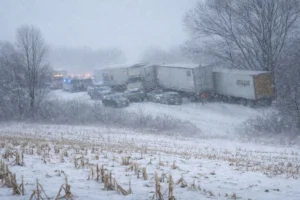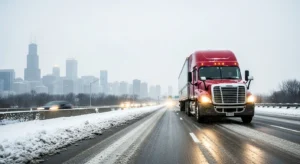A more rigorous federal oversight to protect both the safety of autonomous vehicles and personal and vehicle information is part of a recent proposal.
The U.S. Department of Commerce and the Owner-Operator Independent Drivers Association (OOIDA) have decided to prioritize the safety and cybersecurity of autonomous vehicles in the country. The Department of Commerce is working to address the risks associated with connected vehicle technology, while OOIDA supports the department’s proposal.
A more rigorous federal oversight to protect both the safety of autonomous vehicles and personal and vehicle information is part of a recent proposal from the Department of Commerce’s Bureau of Industry and Security. This regulatory proposal establishes a ban on transactions related to connected vehicle technology from China and other “foreign adversaries.” According to the Department of Commerce, the goal is to mitigate national security risks related to the communication and technology of these vehicles.

Details of the proposal to safeguard national security
The proposal from the Bureau of Industry and Security includes several key restrictions:
- A ban on importers of vehicle connectivity hardware from knowingly importing technology from certain jurisdictions.
- A ban on manufacturers of connected vehicles from selling vehicles that incorporate covered software from these countries.
- Limitations on companies under Chinese or Russian control regarding the sale of vehicles in the U.S. that contain restricted technological components.
OOIDA has stated that these regulations are essential for reducing the risks posed to national security and professional drivers by technological components designed and manufactured by adversaries.

Lack of transparency and external links: OOIDA’s comments
OOIDA has denounced the lack of transparency in the autonomous vehicle sector, citing cases such as TuSimple, whose former executive did not disclose ties to a Chinese company. The Association also questioned whether electronic logging devices (ELDs), mandatory in most commercial vehicles, fall under the new regulation, arguing that their self-certification has created vulnerabilities in cybersecurity.
Additionally, OOIDA emphasized the need for the Bureau of Industry and Security to clarify the application of the regulations to ELDs, stressing that the goal is to mitigate risks to national and public safety. In this way, OOIDA also seeks to promote the transparent and safe development of connected and autonomous vehicle technology.

Miles of love: stories of truckers and their four-legged co-pilots
The love between truckers and their pets is a strong bond, and these stories will surely warm your soul. Love manifests itself in many ways,

Cargo theft report 2025: $725 million in losses
Verisk CargoNet reports that cargo theft crime volumes remained stable, with a sharp increase in total losses. Verisk CargoNet’s 2025 report stated that the total

Ground and Air Transportation Brace for a Weekend of Cancellations and Delays
A historic cold wave is set to disrupt ground and air transportation across the United States, bringing cancellations, delays, and operational restrictions to highways, airports, and essential services throughout the weekend. Federal authorities have activated emergency plans in response to a major winter storm expected to deliver snow, ice, and extreme temperatures to large portions of the country.

Geopolitical tensions and the dispute between Trump and the Federal Reserve
The United States is going through a complex geopolitical environment along with internal tensions between President Donald Trump and the Federal Reserve. In the latest

Polar Vortex Puts U.S. Roads on Alert
A powerful polar vortex outbreak is triggering a widespread winter storm across the United States, bringing snow, ice, and extreme cold to major freight corridors. The event poses a serious risk to trucking operations, road safety, delivery schedules, and commercial vehicle insurance exposure.

DOT unveils possible AI strategy to enforce CDL regulations
The DOT is looking to adopt AI and advanced data analytics to improve the accuracy and effectiveness of enforcement measures. On January 14, the 105th
